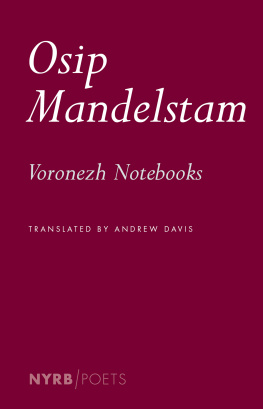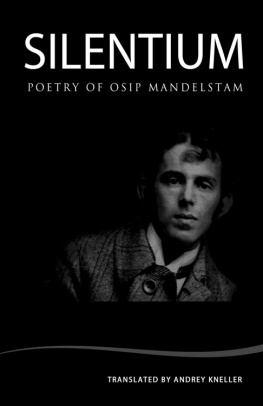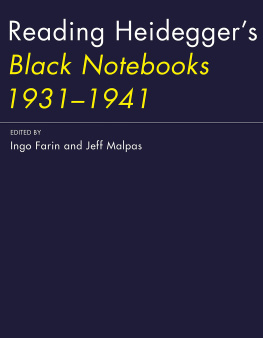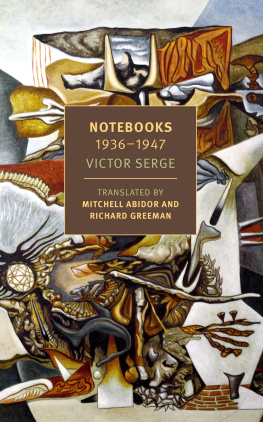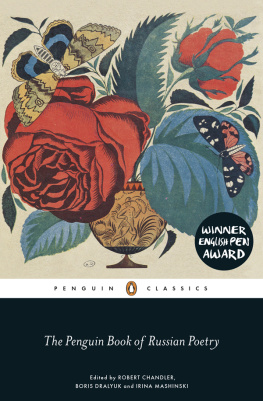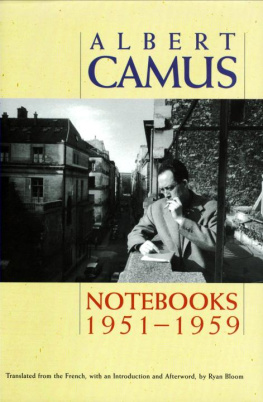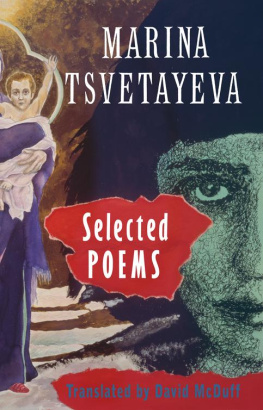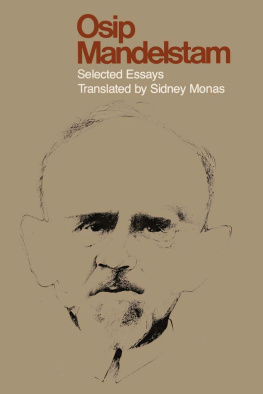OSIP MANDELSTAM (18911938) was born and raised in St. Petersburg, where he attended the prestigious Tenishev School, before studying at the universities of St. Petersburg and Heidelberg and at the Sorbonne. Mandelstam first published his poems in
Apollyon, an avant-garde magazine, in 1910, then banded together with Anna Akhmatova and Nikolai Gumilev to form the Acmeist movement, which advocated an aesthetic of exact description and chiseled form, as suggested by the title of Mandelstams first book,
Stone (1913). During the Russian Revolution, he left Leningrad for the Crimea and Georgia, and settled in Moscow in 1922,where his second collection of poems,
Tristia, appeared. Unpopular with the Soviet authorities, Mandelstam found it increasingly difficult to publish his poetry, though an edition of collected poems did come out in 1928.
In 1934, after reading a poem denouncing Stalin to friends, Mandelstam was arrested and sent into exile. He produced many new poems during these years, and his wife, Nadezhda, memorized his work in case his notebooks were destroyed or lost. (Her extraordinary memoirs of life with her husband, Hope Against Hope and Hope Abandoned, published in the 1970s, later helped to bring Mandelstam a worldwide audience.) In 1937, Mandelstams exile ended and he returned to Moscow, but he was arrested again almost immediately. This time he was sentenced to hard labor in Siberia. He was last seen in a transit camp near Vladivostok. ANDREW DAVIS is a poet, cabinetmaker, and visual artist.
His current project is the long poem IMPLUVIUM. He divides his time between Santa Fe, New Mexico, and the north coast of Spain. Osip Mandelstam Voronezh Notebooks TRANSLATED FROM THE RUSSIAN AND WITH AN INTRODUCTION BY ANDREW DAVIS 

NEW YORK REVIEW BOOKS New York a Amparn y Censi, que me dieron de comerA.D.
THIS IS A NEW YORK REVIEW BOOK
PUBLISHED BY THE NEW YORK REVIEW OF BOOKS 435 Hudson Street, New York, NY 10014 www.nyrb.com Translation and introduction copyright 2016 by Andrew Davis All rights reserved. Library of Congress Cataloging-in-Publication Data Mandelshtam, Osip, 18911938, author. [Voronezhskie tetradi. 1 online resource. (New York Review Books poets ISBN 978-1-59017-911-6 (epub) ISBN 978-1-59017-910-9 (alk. paper) I. paper) I.
Davis, Andrew, translator, writer of introduction. II. Title. PG3476.M355
891.71'3dc23 2015024854 Cover design by Emily Singer ISBN 978-1-59017-911-6
v1.0 For a complete list of books in the NYRB/Poets series, visit www.nyrb.com or write to:
Catalog Requests, NYRB, 435 Hudson Street, New York, NY 10014
Introduction
W. H. AUDEN once complained to Joseph Brodsky: I dont see why Mandelstam is considered a great poet.
The translations that Ive seen dont convince me at alla comment that indicates the conflict between Osip Mandelstams reputation as one of the greatest poets of the twentieth century and his equally notorious impermeability to translation, if not to comprehension itself. Why is Mandelstam so hard to get at? There is, of course, the density of his language and imagery and the prominent role of rhyme and rhythm in his work. He was one of the great orchestrators of language, one of the great masters of sound and cadence, which has posed enormoussome would say insuperableobstacles to translation. Related is the tantalizing, and perennial, question of the differences between Russian and English poetic practice, a question whose scope and complexity is beyond my capacity to deal with here. But underlying everything, I think, is the unique, the radical demand that Mandelstam places on his readers. All of Mandelstams poetry is excavated from the midden of his experience.
This is its fundamental, invariable, characteristic, and essential principle. There was little of the theoretician and nothing of the mystic in him; he was the most earthly of men. One can see this clearly in the highly unusual way he treats three common poetic images, both in the Voronezh Notebooks and in his earlier poetry, images through which he expressed his horror at being separated from life. Not just by deaththough death was a real threat when he was composing the Notebooksbut by anything that prevented him from immersing himself in physical, palpable existence. For Mandelstam, the sky (nebo) most often suggested not some paradise or heaven but sexless, inhuman, asphyxiating emptiness. The appearance of stars in his poetry indicated, as his wife, Nadezhda, pointed out, not a movement toward the eternal but the shrinking away from the essentially human and, therefore, the coming to an end of the poetic impulse.
And air (vozduhk)or rather the lack of it, one of Mandelstams greatest preoccupations in the Notebooksstood in not as an animating principle, not as some cipher for the soul, but as an earthly element. It represented the most insistent of the triad of lifes physical necessitiesfood, water, breathand by extension the freedom to move in a physical world. But for Mandelstam each thing seen or heard or smelt or tasted or felt functioned immediately as a door, as a point of departure into an underworld of passages, chambers, and hidden connections. Each bit of experience was touched, and then moved through, absorbed, and then moved beyond. The movement of Mandelstams poetry was toward not the celestial but the chthonictoward a deeper and deeper exploration of the specific. He did not generalize from experience, and the words attached to that experience, but moved deeper beneath them and within them.
So the readerand the translatormust follow along with Mandelstam, must resist the temptation of the early exit, the premature conclusion, and carry right on, in a sense beyond language, to the core of experience and the roots of words themselves. Mandelstam was, along with Anna Akhmatova, Marina Tsvetaeva, Nikolai Gumilev, and a host of others, part of a remarkable florescence of Russian poetry at the beginning of the Soviet era. His extraordinary talents manifested themselves and were recognized early: his first book, Kamen (Stone), was published in 1913 when he was only twenty-two. He quickly took his place among the leading poets of the day. The intimate friendship he formed with Akhmatova during this period was unshakable, lifelong. Mandelstams great early success and initial sympathy with the revolutionary changes sweeping Russia were followed by a period of increasing isolation and disillusionment with the form those changes were assuming.
By the mid-1920s he had been reduced to silence. Prevented from publishing his poetry and condemned to translation to make a living, he struggled both internally and externally to find his place in the new world that was coming into being around him. Whether by some sort of personal miracle or by exposure to the rockbound, original virtue of the landscape and language, or whether because his period of wandering in the desert had come to its natural, inevitable end, a trip to Armenia in the early 1930s (which he wrote about in prose in Journey to Armenia) restored his internal compass, his sense of purpose, and his poetic voice. From that point on a confrontation with the literary establishment, and the regime itself, was inevitable. When it came, it was, in the context of the time, spectacular. His Poem on Stalin of November 1933 was completely uncharacteristic in that it was overtly political.
Its composition was an act of extraordinary foolhardinessthe inevitable consequences of which he seemed, somehow, to have willfully ignored. In it he directly calls Stalin a murderer, and he confirmed and compounded his crime by sharing the poem with some twenty of his acquaintances. His fingers are fat as grubs And the words, final as lead weights, fall from his lips, His cockroach whiskers leer And his boot tops gleam. He was, of course, denounced and arrestedwhich should have meant his death. Fortunately, he still had friends in high places. (At that point still a powerful minister in the government, Bukharin would himself be sentenced to death in Stalins 1936 show trials.) Instead Mandelstam was sent into internal exile, and Nadezhda was allowed to go with him. (At that point still a powerful minister in the government, Bukharin would himself be sentenced to death in Stalins 1936 show trials.) Instead Mandelstam was sent into internal exile, and Nadezhda was allowed to go with him.

